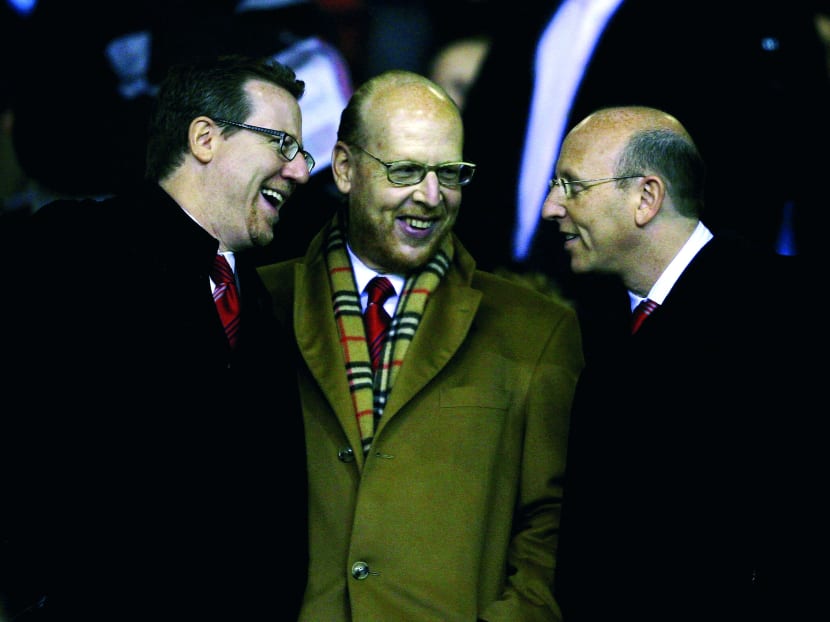United must decide between football or money
Sacking a manager 10 months into a six-year contract is only one sign of vast cultural change at Manchester United. Another was Alex Ferguson striding on to the Old Trafford pitch along an avenue of DHL flags to wave goodbye after 26 years in charge.

The Glazer brothers. PHOTO: GETTY IMAGES
Sacking a manager 10 months into a six-year contract is only one sign of vast cultural change at Manchester United. Another was Alex Ferguson striding on to the Old Trafford pitch along an avenue of DHL flags to wave goodbye after 26 years in charge.
At a club less commercially motivated, Ferguson would have stepped onto a “clean” field, with nothing to distract the eye from the poignance of his retirement. In keeping with United’s unashamed drive to accommodate corporate partners, the moment was commercialised as well as enshrined. Soon after Ferguson gave way, United’s marketing and social media departments turned hyperactive, as if the constraints that made the footballing side the beginning, the middle and end of everything had lifted.
David Moyes was dismissed first of all for footballing reasons, but his departure brings the club to arguably the biggest junction in their history. What identity will United choose now? Who will make the biggest decisions? Will they join the superpower mainstream of pragmatism and three-year cycles or restructure the whole football operation while holding dear the Busby and Ferguson traditions? Only Ryan Giggs, who takes over on a caretaker basis, would have allowed the old long-termism to continue, but that possibility has now been ruled out.
Thus the Glazer family, who impaled Moyes rather than give him a £150 million (S$317 million) transfer fund potentially to squander, have decided in favour of a guaranteed A-list trophy-farmer to calm investors and service the Glazer debt.
Ed Woodward, the breezy and City-savvy executive vice-chairman who took over from David Gill, sees no contradiction between the rampant pursuit of commercial partnerships and the football team’s quality. He sees United’s vast network of tie-ups as complementary to the business of winning battles with Manchester City, Chelsea and now Liverpool, not to mention Europe’s heavyweights.
The light now falls on the decisions being made at Old Trafford. In that sense, the past 12 months have been instructive, concocted from positions of weakness rather than old strengths. Foremost among them, after a summer of missed transfer targets and the ill-fated purchase of Marouane Fellaini, was the spectacular new contract for Wayne Rooney, who has twice exploited a low ebb at United to inflate his own salary — another way of seeing it was that United recklessly threw a £300,000-a-week salary at a 28-year-old who has already peaked.
As the fog starts to clear, it is easy to enumerate all the things United will be glad to see the back of now. Ponderous football, deferential language in media conferences, players effectively leaving halfway through the season (Nemanja Vidic), 51 different starting line-ups, the Robin van Persie problem, planes dragging protest banners across the Manchester skies, doomed transfer pursuits and close-in shots of Ferguson in the directors’ box.
But what happens then? Getting rid of a manager many considered to be under-qualified for the job cannot save those players who have performed so abjectly from what you might politely call an annual review. Nor should Rooney be allowed to recline on the laurels of his new salary and leave the fightback to others. Asked for advice by young managers, George Graham once said: “Remember, when you walk in the dressing room for the first time — these are the b------- who cost the last guy his job.”
That lesson would not be lost on Louis van Gaal, who would embody the old line about being careful what you wish for.
United can justify being a deal-making factory to service the Glazer debt only if the football side is paramount and the right people are making the decisions, which means Gill, Bobby Charlton and Ferguson still supplying the wisdom on who should occupy the dugout and how the playing side should evolve. All three would argue for a structure rather than hire-and-fire or Hollywood thinking.
While the exodus of Moyes appointees will make Carrington feel more like home again, the club, insulated from having to make a decision about the manager for 26 years, are now in the same mud-wrestling contest as everyone else.
THE DAILY TELEGRAPH
ABOUT THE AUTHOR:
Paul Hayward is The Daily Telegraph’s chief sports writer.





